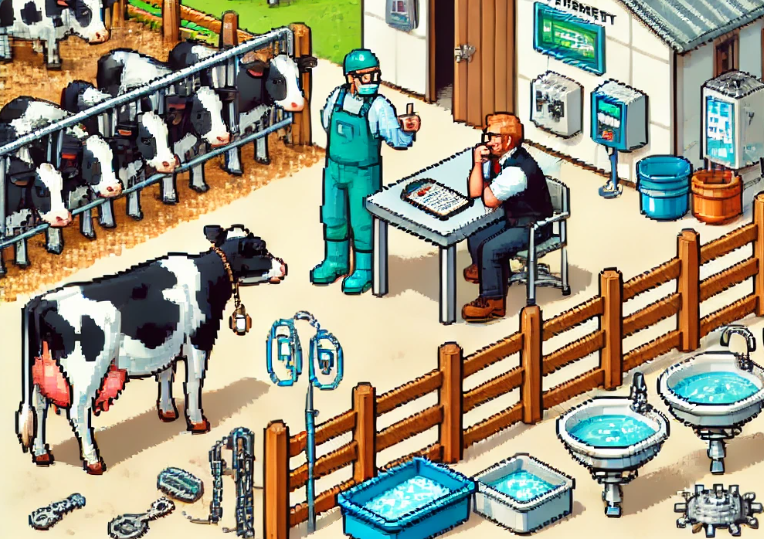
Biosecurity in Livestock
Biosecurity measures are essential to keep livestock healthy and prevent the spread of diseases. But what do the veterinarians who enforce these measures think about them? A recent study in Spain sheds light on the perceptions of government veterinarians regarding biosecurity practices on dairy cattle farms in Galicia and Catalonia. Their insights could be key to improving biosecurity implementation and ensuring the health of livestock.
Understanding Biosecurity
Biosecurity involves practices and measures designed to protect animals from infectious diseases. This includes controlling who enters the farm, maintaining hygiene, and managing the movement of animals. Effective biosecurity practices can greatly reduce the risk of disease outbreaks, which is crucial for the health of animals and the economic stability of farms.
The Role of Government Veterinarians
Government veterinarians play a dual role in biosecurity. They are both advisors and enforcers. However, the study found that farmers often view them more as enforcers, which creates a barrier to effective communication and cooperation. Farmers may only implement biosecurity measures to avoid penalties rather than understanding their importance for animal health.
Challenges in Biosecurity Implementation
The study highlighted several challenges faced by government veterinarians in promoting biosecurity:
- Limited Resources: There are not enough staff and time to ensure all farms are regularly inspected. This limitation hampers the ability to provide consistent and comprehensive advice to farmers.
- Advisory Role Undermined: Farmers often do not recognize the advisory role of government veterinarians, seeing them primarily as enforcers. This perception limits the effectiveness of biosecurity training and advice.
- Economic Constraints: Implementing biosecurity measures can be costly. Farmers with limited financial resources may struggle to meet biosecurity standards, leading to inconsistent implementation.
Insights from Veterinarians
Through eleven interviews, government veterinarians expressed their views on various aspects of biosecurity:
- Flexibility of Regulations: Veterinarians believe that biosecurity regulations should be flexible to accommodate the diverse contexts of different farms. One-size-fits-all solutions are often impractical.
- Awareness and Training: There is a need for better biosecurity awareness and training for farmers. Veterinarians emphasized that farmers should understand the reasons behind biosecurity measures, not just see them as regulatory requirements.
- Communication and Collaboration: Improved communication between government veterinarians, farmers, and other stakeholders is crucial. Regular meetings and discussions can help align the perspectives of all parties involved.
Key Takeaways for Public Health Practitioners
For public health practitioners, understanding the challenges and perspectives of government veterinarians is vital. Effective biosecurity is not just about enforcing rules but about building trust and cooperation with farmers. Practitioners can play a role in facilitating better communication and providing resources for training and education.
Why It Matters
The health of livestock directly impacts public health. Diseases in animals can transfer to humans (zoonoses), and managing these risks is crucial for preventing outbreaks. By improving biosecurity practices, we can ensure healthier livestock populations and safer food supplies.
What do you think?
- What experiences have you had with biosecurity measures on farms or in other settings? How do you think these measures could be improved?
- How can we better support farmers in understanding and implementing effective biosecurity practices? What role should government veterinarians play in this process?
Be a Health Innovator – Get Weekly Updates!
Stay informed and active. Subscribe for free and share this blog to make a difference in public health.
About the Author
Dr. Jonathan P. Scaccia, PhD, is a clinical-community psychologist with expertise in public health science and practice. He has led evaluation and research initiatives focusing on health equity, vaccine distribution, and organizational readiness. Dr. Scaccia has contributed to federal suicide prevention programs and vaccine equity strategies. He has been recognized for his impactful work and is a leading voice in advancing public health practices.


